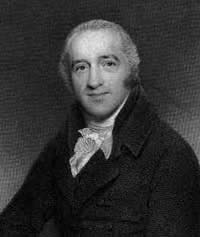Charles Simeon (1759–1836)
 Charles Simeon (1759–1836)
Charles Simeon (1759–1836)
In his childhood Simeon was sent to Eton, and at nineteen he went up with a scholarship to King's College in Cambridge. There he succeeded to a Fellowship, which he held till his death.
At the age of twenty-three he was ordained Deacon, and next year a Priest. In 1782 Simeon was made Minister of the Church of the Holy Trinity in Cambridge. In this pastorate he lived and expressed the love of Christ to society around him, for decade after decade, in spite of countless vicissitudes. There he endured evil gossiping; there he received good reports; there he met burdens and difficulties; and there he saw the grace of God triumphing.
In God's wise providence, something quite casual and commonplace served as a prick for Simeon to realise his lost estate, his company with the devil, and his misery outside of Christ and outside of God's covenant.
Three days after his arrival in Cambridge, Simeon was told by the Provost that within a few weeks, Holy Communion was to be administered in the Chapel, and that he must communicate on that day.
"'What,' said I, 'must I attend?' On being informed that I must, the thought rushed into my mind that Satan himself was as fit to attend as I; and that if I must attend, I must prepare for my attendance there." Whereas others might have brushed the notice aside, Simeon's soul was exercised to consider his own ways. He purchased William Law's illustrious book, The Whole Duty of Man, and began to look into it with diligence. He saw himself for what he truly was, a man destitute of grace and mercy. Enabled by the Spirit of supplication, he cried out to God for mercy, "and so earnest was I in these exercises that within the three weeks I made myself quite ill with reading, fasting, and prayer."
It was Saturday, the nineteenth of November, 1836, when a funeral took place at King's College Chapel in Cambridge. The remains of a self-effacing servant of God, were interred in the ground, awaiting the voice of the Son of God when He shall call the dead out of their graves at the Last Day. There the aged pastor of souls had indicated in his will that his bones should rest: he had "loved the habitation of this house of God," the scene of his incessant labours and loving toil in the Gospel of Christ
In recognition of their loss, the congregation erected a memorial tablet and affixed it to the chancel wall, close to his intimate friends Martyn and Thomason. It read:
In Memory of
THE REV. CHARLES SIMEON, M.A.,
Senior Fellow of King's College,
And fifty-four years vicar of this parish; who,
whether as the ground of his own hopes,
or as the subject of all his ministrations,
determined to know nothing but
JESUS CHRIST AND HIM CRUCIFIED.
1 Cor.II.2.
"He being dead yet speaketh"
http://www.tecmalta.org/tft353.htm
